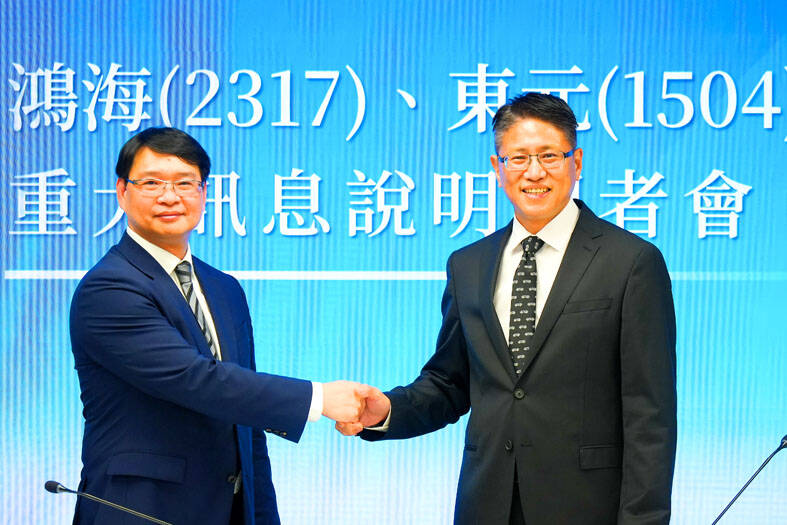Manufacturing giant Hon Hai Precision Industry Co (鴻海精密) and industrial motor maker Teco Electric and Machinery Co (東元電機) yesterday announced that they would be forming a strategic partnership through a share exchange to tap into the global artificial intelligence (AI) data center market.
Under the deal, Hon Hai would issue 72.48 million new shares and Teco would issue 237.64 million new shares, with the share swap ratio set at one Teco share per 0.305 Hon Hai shares, the companies told a news conference at the Taiwan Stock Exchange in Taipei.
The swap ratio was mutually agreed upon with reference to their respective market prices and the net asset value per share as of March 31, the firms said.

Photo: CNA
After the transaction, Hon Hai would hold a 10 percent stake in Teco and Teco would have a 0.519 percent stake in Hon Hai, they said.
Hon Hai and Teco expect to complete the share exchange in the fourth quarter, conditional on regulatory approvals, the companies said.
Shares of the two companies were suspended from trading yesterday after closing at NT$171.5 for Hon Hai and NT$46.4 for Teco on Tuesday. They are to resume trading today.
Hon Hai, also known as Foxconn Technology Group (富士康科技集團), said that the two companies would jointly explore AI data center business opportunities as the global trend points toward standardization and modularization.
“Time-to-market is key in the global super-computing race, while modular design is gaining popularity,” Hon Hai chairman Young Liu (劉揚偉) said in a joint statement.
“As AI data centers grow in size and demand ramps up, teaming up with Teco would enable both companies to level up and rapidly deliver comprehensive, vertically integrated solutions to our customers — tier-1 cloud service providers and hyperscalers,” Liu said.
Hon Hai, which manufactures vertical integrated AI server components and racks, aims to extend the value chain to data center construction through the partnership with Teco, the New Taipei City-based company said.
Global customers would benefit from their comprehensive data center modular products, electromechanical engineering services, and cost-competitive, one-stop solutions, it said.
Teco also expects the partnership to help expand the two companies’ global presence in AI data centers and related businesses, with target markets covering Taiwan and the rest of Asia, as well as the Middle East and the US.
“The strategic partnership extends the two companies’ cooperation in the fields of low-carbon smart factories and energy services, toward being a one-stop solution for data centers going forward.” Teco chairman Morris Li (利明献) said in the statement.
With its Teco-Westinghouse Motor Co unit in Texas, the company provides US manufacturing and local services, Li said.
This, together with Hon Hai’s manufacturing base in the US, is in line with the companies’ strategic direction to expand manufacturing in the US and reshape the global supply chain, he added.

POWERING UP: PSUs for AI servers made up about 50% of Delta’s total server PSU revenue during the first three quarters of last year, the company said Power supply and electronic components maker Delta Electronics Inc (台達電) reported record-high revenue of NT$161.61 billion (US$5.11 billion) for last quarter and said it remains positive about this quarter. Last quarter’s figure was up 7.6 percent from the previous quarter and 41.51 percent higher than a year earlier, and largely in line with Yuanta Securities Investment Consulting Co’s (元大投顧) forecast of NT$160 billion. Delta’s annual revenue last year rose 31.76 percent year-on-year to NT$554.89 billion, also a record high for the company. Its strong performance reflected continued demand for high-performance power solutions and advanced liquid-cooling products used in artificial intelligence (AI) data centers,

SIZE MATTERS: TSMC started phasing out 8-inch wafer production last year, while Samsung is more aggressively retiring 8-inch capacity, TrendForce said Chipmakers are expected to raise prices of 8-inch wafers by up to 20 percent this year on concern over supply constraints as major contract chipmakers Taiwan Semiconductor Manufacturing Co (TSMC, 台積電) and Samsung Electronics Co gradually retire less advanced wafer capacity, TrendForce Corp (集邦科技) said yesterday. It is the first significant across-the-board price hike since a global semiconductor correction in 2023, the Taipei-based market researcher said in a report. Global 8-inch wafer capacity slid 0.3 percent year-on-year last year, although 8-inch wafer prices still hovered at relatively stable levels throughout the year, TrendForce said. The downward trend is expected to continue this year,

Vincent Wei led fellow Singaporean farmers around an empty Malaysian plot, laying out plans for a greenhouse and rows of leafy vegetables. What he pitched was not just space for crops, but a lifeline for growers struggling to make ends meet in a city-state with high prices and little vacant land. The future agriculture hub is part of a joint special economic zone launched last year by the two neighbors, expected to cost US$123 million and produce 10,000 tonnes of fresh produce annually. It is attracting Singaporean farmers with promises of cheaper land, labor and energy just over the border.

US actor Matthew McConaughey has filed recordings of his image and voice with US patent authorities to protect them from unauthorized usage by artificial intelligence (AI) platforms, a representative said earlier this week. Several video clips and audio recordings were registered by the commercial arm of the Just Keep Livin’ Foundation, a non-profit created by the Oscar-winning actor and his wife, Camila, according to the US Patent and Trademark Office database. Many artists are increasingly concerned about the uncontrolled use of their image via generative AI since the rollout of ChatGPT and other AI-powered tools. Several US states have adopted